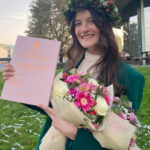
Marialaura De Grazia
Marialaura De Grazia is a Ph.D student in Biomedical Sciences at the Department of Brain and Behavioral Sciences of the University of Pavia. Her Ph.D. project is focused on multiscale modelling for relevant cerebellar disorders, mainly ataxia, and investigation of the effects of promising therapeutic tools such as transcranial magnetic stimulation (TMS). She holds a degree in Physics and then a master’s degree in Physics of Complex Systems at the University of Pisa.

Maria Conforti
Maria Conforti is a Ph.D student in Biomedical Sciences at the Department of Brain and Behavioral Sciences of the University of Pavia. She holds a bachelor’s degree in Biological Sciences at the University of Genova and then a master’s degree in Neurobiology at the University of Pavia. Her Ph.D project aims at investigating the cerebellar interaction with other brain areas by performing In Vivo electrophysiological recordings combined with optogenetic stimulation in anesthetized mice. She is also exploring the cerebellar contribution over the Prefrontal Cortex activity in the IB2 KO mouse model of autism.

Gökçe Korkmaz
Gökçe Korkmaz, is a PhD student in Biomedical Sciences, Neuroimaging & Brain Modelling Lab at the University of Pavia. Her PhD project includes the brain modelling for inferring the causal brain architecture of coupled or distributed dynamical systems by using the Dynamic Causal Modelling framework. She had her Master’s degree in Psychology, Neuroscience and Human Sciences at the University of Pavia and obtained her degree in Psychology from the Middle East Technical University in Turkey.
Eleonora Lupi
Eleonora Lupi is a PhD student enrolled in the National PhD in Artificial Intelligence, course on Health and life sciences, organized by Università Campus Bio-Medico di Roma. She holds a master’s degree in Bioengineering at the University of Pavia, and her master’s degree thesis has the title “Myelin quantification in Magnetic Resonance Imaging: investigation and development of a new method to obtain g-ratio quantitative images from different acquisition techniques”.
Her PhD project aims to use AI methods to develop a multiscale approach capable of simulating complex brain dynamics in both healthy and pathological brains, integrating subject-specific biophysical features into brain dynamics simulation.
Emiliano Buttarazzi
Emiliano Buttarazzi is a PhD student enrolled in the National PhD in Artificial Intelligence, course on Health and life sciences, organized by Università Campus Bio-Medico di Roma.
 Matteo Vitacca
Matteo Vitacca
Matteo Vitacca is a PhD student in Biomedical Sciences at the Neuroimaging and Brain Modelling Lab. He holds a bachelor’s degree in Psychological Sciences and Techniques from the University of Milano-Bicocca and a master’s in Cognitive Neuroscience and Clinical Neuropsychology from the University of Padova, where he also obtained his psychologist license.
His project focuses on clarifying the role of the cerebellum and the glutamatergic system in Cognitive Impairment Associated with Schizophrenia (CIAS), with the aim of advancing preclinical models and developing personalized therapies through The Virtual Brain (TVB) simulations of neural activity.
Andrea Fusari
Andrea Fusari is a Ph.D. student in Biomedical Sciences at the Department of Brain and Behavioural Sciences, University of Pavia, Italy. He earned a bachelor’s degree in Medical Biotechnology from the University of Milan, followed by a master’s degree in Neurobiology from the University of Pavia. His master’s thesis is titled “Curated Reconstruction of the Axonal Bundles of the Olfactory Circuit Using Tractography: Assessment of the Impact of Using A Priori Biological Constraints”.
Currently, Andrea’s Ph.D. research focuses on “Cerebellar Structural and Functional Characterization Toward Task-Dependent Digital Brain Twins”. This project aims to develop a task-specific Virtual Brain (TVB) model to simulate neural dynamics during fear conditioning tasks, contributing to innovative approaches in brain modelling and neurobehavioral research.



